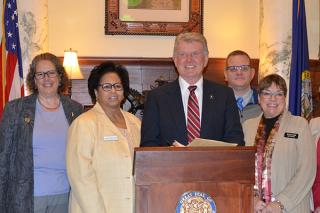Search Summary Text
<div>Landmark legislation signed by Idaho Governor </div>

Marty Durand, transplant recipient, Sen. Cherie Buckner Webb, sponsor (D, Dist. 19, Boise), Idaho Gov. Butch Otter, Alex Fox, Kidney Advocacy Committee Member, NKF, Rep. Sally Toone, House floor sponsor (D, Dist. 26, Gooding)
Landmark legislation signed by Idaho Governor
Boise, ID—March 20, 2018—“Today, Idaho Governor Butch Otter signed landmark legislation, S. 1302, to protect living organ donors from potential insurance discrimination. Too often living organ donors, who are healthier than the U.S. population at large, face insurance discrimination based solely on their status as a living organ donor. Today’s legislation in Idaho is the first of its kind in the nation designed to stop such discrimination.”
“The Idaho legislation, S. 1302, makes it unlawful to discriminate in the offering, issuance, cancellation, price or conditions of a policy, including the amount of coverage provided, based solely upon the status of the individual as a living organ donor. The National Kidney Foundation applauds Governor Otter for standing up for kidney patients, 100,000 of whom are waiting on a life-saving transplant right now.”
“The National Kidney Foundation applauds bill sponsor Idaho State Senator Cherie Buckner-Webb and Committee leaders in the Senate and House for their efforts in support of organ donation. In 2017, nearly 20,000 Americans received a kidney transplant and one-third of these transplants were made possible by living donors.”
“Expanding living donation by removing barriers will help more people obtain a life-saving transplant. Organ donors undergo significant testing prior to being approved as a donor and must be in very good overall health before being permitted to donate. Most donors do not experience long term complications related to organ donation and therefore insurance discrimination is unjustified.”
“The Idaho legislation is modeled after The Living Donor Protection Act, introduced in the U.S. House of Representatives in March 2017 by Representative Jerry Nadler (D-NY) and Representative Jaime Herrera Beutler (R-WA). The Living Donor Protection Act would prohibit discrimination in life, disability or long-term care insurance for living organ donors and add living donation to the Family Medical Leave Act.”
“Living organ donation not only saves lives, it saves money. Each year, Medicare spends $87,000 per dialysis patient and less than half, $32,500, for a transplant patient.”
National Kidney Foundation Living Donation Resources
THE BIG ASK: THE BIG GIVE platform, which provides nationwide outreach, is designed to increase kidney transplantation through training and tools that help patients and families find a living donor. It includes direct patient and caregiver support through our toll-free help line 855.NKF.CARES (855.653.2273) peer mentoring from a fellow kidney patient or a living donor, online communities, an advocacy campaign to remove barriers to donation, and a multi-media public awareness campaign. All of these resources are free and designed to teach kidney patients, or their advocates, how to make a “big ask” to their friends, loved ones, or community to consider making a “big give,” a life-saving living organ donation. For more information visit www.kidney.org/livingdonation.
Kidney Disease Facts
In the United States 30 million adults are estimated to have chronic kidney disease—and most aren’t aware of it. 1 in 3 American adults are at risk for chronic kidney disease. Risk factors for kidney disease include diabetes, high blood pressure, heart disease, obesity and family history. People of African American, Hispanic, Native American, Asian or Pacific Islander descent are at increased risk for developing the disease. African Americans are 3 times more likely than Whites, and Hispanics are nearly 1.5 times more likely than non-Hispanics to develop end stage renal disease (kidney failure).
The National Kidney Foundation (NKF) is the largest, most comprehensive and longstanding organization dedicated to the awareness, prevention and treatment of kidney disease. For more information about NKF visit www.kidney.org.
#####